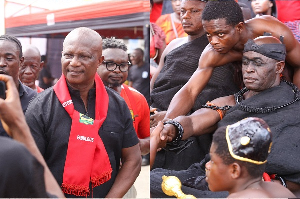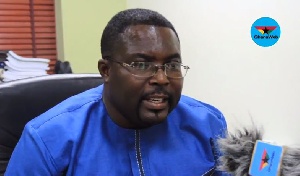Accra, Dec. 21 GNA- The Supreme Court by a majority decision of four to one on Friday quash an application brought before it by the Commission for Human Rights and Administrative Justice (CHRAJ) on whether the commission had powers to investigate issues publish in the media without a formal complainant.
The suit also included the Mr Joe Ghartey, Attorney General and Minister of Justice as party to the case.
The court, which empanelled five Supreme Court Justices for the sitting, included the Mrs Justice Georgina Theodora Wood, the Chief Justice, Mr Justice Stephen Brobbey, Dr. Justice Kofi Date-Baah, Mr Justice Julius Ansah and Mr Justice Aninakwah.
The Attorney General and Minister of Justice was represented by Mr Alfred Asiamah-Sampong, a Deputy State Attorney, Mrs Evelyn Keelson, a Senior Attorney and Ms Barbara Sackey.
Nene Amegatcher, Lead Counsel for the Commission, after the judgment asked the court to give directive as to the position of previous cases which the Commission had investigated without formal complaint.
"My Lords, I humbly submit that the court should give its directive on the issue because there was likely to be more legal challenges to Commission because of this judgment"
However, Mr Joseph Kwesi Agyemang Lead Counsel for Dr Richard Anane rejected the claims of the applicants and said what the court sought to do was whether the commission had powers to investigate issues published in the media without a formal complainant.
He said there were enough laws and legal authorities to deal with, when the issue comes up.
The Chief Justice in her decision said Article 218 (a) required that a formal complaint have to be lodged with the commission before it could investigate issues published in the media or made at public fora. She said if formal complaint were not made to the commission people could subject the process to abuse and make wild allegations against public official based on mere suspicion and speculations.
She said Article 218 (e) was never meant to be a catchall provision in the constitution and that a formal complaint was needed to start an investigation into alleged corruption by a public official. Mr Justice Stephen A. Brobbey in his decision said a complaint had to be made by an identifiable body or person.
He said the ordinary or natural meaning of the word "formal complaint" should first be understood before resorting its constitutional interpretation.
He said complaint made under Article 218 (a)(b) and (c) required that there should be an identifiable complainant to help the commission do its investigation.
He urged CHRAJ to make new regulations to streamline complaint made under informal compliant process.
Dr. Justice Kofi Date-Baah, who disagreed on the issue, said Article 141 of the 1992 constitution was inconsistent with the Common Law. He argued that CHRAJ was not a quasi-judicial body or an inferior judicial body.
He said the court should focus on the direct constitutional interpretation of the word and not what anybody says it is. Dr. Justice Date-Baah also stated that to insist on formal complaint for the Commission work would constrain them and defeat the Commission's mandate to fight corruption and abuse of human rights in the system. Mr Justice Julius Ansah and Mr Justice Aninakwah in their decisions insisted a formal complainant was needed in order for people not make unsubstantiated allegations against public officials on speculations in the media.
They said the complaint must not be in a vacuum and that it must be traced to an identifiable body or person.
General News of Friday, 21 December 2007
Source: GNA
















